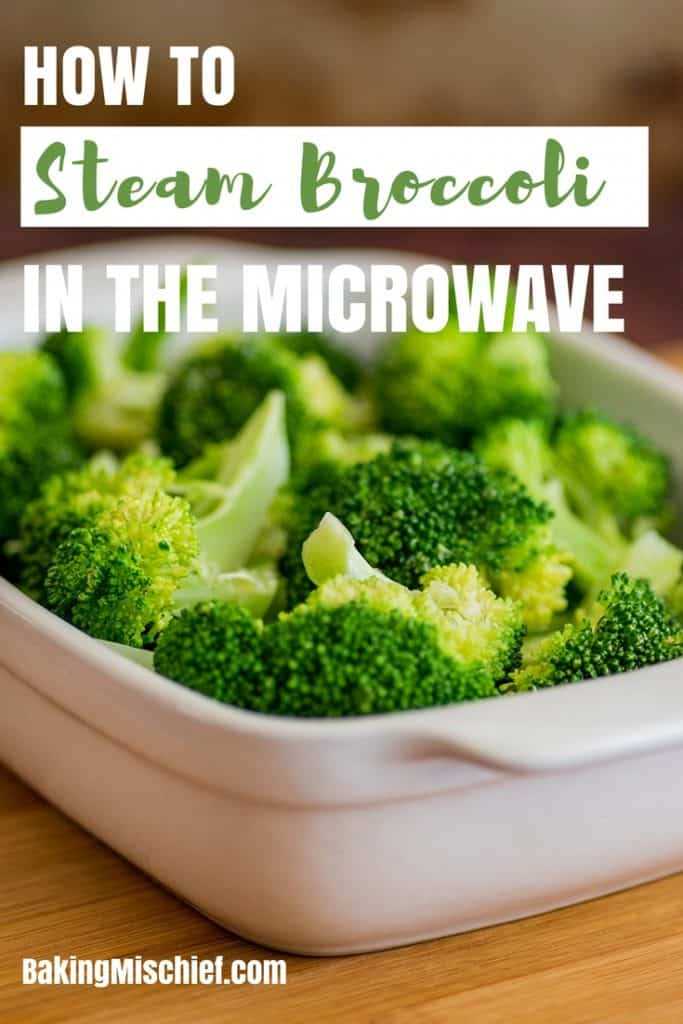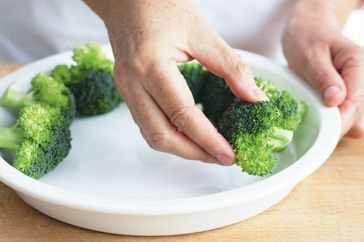Yes, you can! Cooking vegetables in the microwave is a convenient and quick way to prepare a healthy meal. With the right technique, you can preserve the nutrients and flavors of your vegetables while saving time in the kitchen. Whether you’re a busy professional or someone who prefers fuss-free cooking, using a microwave can be a game-changer.
But how do you cook vegetables in the microwave? Is it as simple as popping them in a bowl and pressing a few buttons?
Well, almost. While cooking vegetables in the microwave is quick and easy, you need to follow a few guidelines to ensure the best results. This includes choosing the right type of vegetables, preparing them correctly, and using the right amount of cooking time and power settings. By doing so, you can have perfectly cooked vegetables that retain their vibrant colors, textures, and nutritional value.
“Microwaving vegetables is not only a time-saver, but it also helps in retaining a higher level of nutrients compared to other cooking methods.”
So, if you’ve been hesitant to use your microwave for cooking vegetables, don’t be! Give it a try and discover the many benefits of using this versatile kitchen appliance.
Advantages of Cooking Vegetables in Microwave

Cooking vegetables in a microwave has several advantages over traditional methods. Here are some of the key benefits:
1. Retains Nutrients
Microwaving vegetables helps to retain a higher concentration of nutrients compared to other cooking methods. The short cooking time and minimal amount of water used in the microwave process help to preserve the vitamins and minerals in the vegetables.
2. Time Efficiency
Cooking vegetables in a microwave is a quick and efficient way to prepare a healthy meal. The microwave heats the food directly, reducing the cooking time significantly. This is especially convenient for those with busy schedules or limited time for cooking.
3. Preserves Color and Flavor
Microwaving vegetables can help to retain their natural colors and flavors. The gentle cooking process in the microwave helps to prevent the loss of vibrant colors and intense flavors that can occur with other cooking methods.
4. Ease of Use
Using a microwave to cook vegetables is incredibly easy. Simply place the vegetables in a microwave-safe dish, add a small amount of water, cover the dish, and cook according to the recommended time. There are no complex steps or techniques involved, making it a hassle-free cooking method.
5. Energy Efficiency
A study conducted by the Harvard Medical School found that microwaving broccoli retained more nutrients, including vitamins C and E, compared to boiling or stir-frying. Microwaving vegetables also helps to preserve their vibrant colors, which are not only visually appealing but also an indication of their nutrient content.
Furthermore, microwaving vegetables reduces the risk of overcooking, as it allows you to control the cooking time more precisely. Overcooked vegetables can become mushy and lose their nutritional value.
| Nutrients | Boiling | Microwaving |
|---|---|---|
| Vitamin C | Loss of 25% | Loss of 10% |
| Vitamin E | Loss of 50% | Loss of 20% |
| Color | Dull | Vibrant |
While it’s important to note that nutrient losses can occur with any cooking method, microwaving provides a convenient way to cook vegetables while retaining more of their nutritional value.
Saves Time
Using a microwave to cook vegetables can save you a significant amount of time in the kitchen. Traditional cooking methods such as boiling or steaming can take a while to heat up and cook the vegetables thoroughly. With a microwave, you can quickly cook your vegetables in a fraction of the time.
Microwaves work by using electromagnetic waves to generate heat directly within the food, rather than heating the surrounding air like conventional ovens. As a result, the vegetables cook faster and more evenly.
Convenience
Microwaving vegetables is also incredibly convenient. You can easily pop them in a microwave-safe container, set the time, and let the microwave do its job. There’s no need to constantly monitor the cooking process like you would with other methods. This allows you to multitask and focus on other aspects of your meal preparation.
Retains Nutrients
Contrary to popular belief, microwaving vegetables can actually help retain more nutrients compared to other cooking methods. The short cooking time and minimal use of water help preserve the vitamins and minerals that are often lost during boiling or steaming. Additionally, the high heat generated by microwaves can help break down cell walls, making the nutrients more accessible for digestion.
Preserves Color and Texture
Microwaving vegetables preserves their natural color and texture. Unlike boiling or steaming, which can cause vegetables to become mushy and lose their vibrant colors, microwaving allows for quick and efficient cooking while retaining their crispness and bright hues.
When vegetables are cooked in a microwave, they retain more of their nutrients as compared to traditional cooking methods. The quick cooking time and minimal exposure to heat help in preserving the vitamins and minerals that are essential for a healthy diet.
Retains Nutritional Value
Studies have shown that microwaving vegetables can help retain a higher percentage of their antioxidants and phytochemicals, which are important for boosting the immune system and fighting off chronic diseases. These compounds can be easily degraded by excessive heat, but microwaving allows for precise and controlled cooking, ensuring that the vegetables retain their nutritional value.
Convenient and Time-Saving
Microwaving vegetables is a convenient and time-saving method of cooking. With the microwave, you can easily cook small quantities of vegetables without the need for multiple pots and pans. This makes it ideal for those with busy schedules or limited kitchen space.
In addition, microwaving also saves time as it requires less preparation. You can simply wash and chop the vegetables, place them in a microwave-safe dish, and cook them within minutes. This allows you to have a quick and healthy meal without the need for extensive cooking skills or time-consuming processes.
| Microwaving vegetables: | Benefits: |
|---|---|
| Preserves color and texture | Retains nutritional value |
| Quick and efficient cooking | Convenient and time-saving |
Reduces the Need for Oil
One of the benefits of cooking vegetables in the microwave is that it greatly reduces the need for oil. When we traditionally cook vegetables on the stovetop or in the oven, we often need to add oil to prevent sticking and to enhance the flavor. However, when cooking vegetables in the microwave, there is no need for oil as the steam generated from the water content in the vegetables helps to keep them moist and prevents them from sticking to the cooking dish.
By eliminating the need for oil, cooking vegetables in the microwave can significantly reduce the overall calorie and fat content of the dish. This makes it a healthier option for those who are conscious about their calorie intake or are trying to maintain a balanced diet.
In addition to reducing the need for oil, cooking vegetables in the microwave also helps to preserve more of their nutritional value. Traditional cooking methods such as boiling or frying can cause the vegetables to lose some of their vitamins and minerals. The quick cooking time in the microwave helps to retain more nutrients, ensuring that you get the maximum nutritional benefits from your vegetables.
Furthermore, cooking vegetables in the microwave is quick and convenient. It saves time compared to traditional methods, which is especially useful for busy individuals or those who want to prepare a quick and healthy meal. Whether you’re steaming broccoli or cooking a medley of mixed vegetables, the microwave provides a hassle-free way to enjoy delicious and nutritious vegetables in no time.
In conclusion, cooking vegetables in the microwave reduces the need for oil, making it a healthier option. It helps to retain more nutrients and is a convenient and time-saving method of preparing vegetables. So next time you’re looking to cook veggies quickly and effortlessly, give the microwave a try!
Convenient for Small Portions
One of the great advantages of cooking vegetables in the microwave is that it is extremely convenient, especially when you only need to prepare a small portion. Microwave cooking allows you to quickly heat up or steam your vegetables without having to worry about a large pot or pan on the stove.
For those who live alone or have a small household, using the microwave to cook vegetables can be a time-saving and space-saving option. You don’t have to wait for a big pot of water to boil or struggle with cleaning up a large cooking apparatus.
In addition, using the microwave for cooking small portions of vegetables can help reduce food waste. With conventional methods, you may have to cook more than you actually need, leading to leftovers that may go to waste. But with the microwave, you can easily cook the exact amount of vegetables you want to eat, minimizing leftovers and promoting sustainability.
So, if you’re looking for a quick and convenient way to cook vegetables for a small portion, using the microwave is an excellent choice. It’s hassle-free, time-saving, and can help reduce food waste, contributing to a more sustainable lifestyle.
Questions and answers
Is it possible to cook vegetables in a microwave?
Yes, it is possible to cook vegetables in a microwave. Microwave cooking is a quick and convenient way to prepare vegetables. Just make sure to follow the recommended cooking times and methods for each type of vegetable.
What types of vegetables can be cooked in a microwave?
Most types of vegetables can be cooked in a microwave. Examples include broccoli, carrots, peas, corn, and potatoes. However, leafy greens like spinach or lettuce are not ideal for microwave cooking as they tend to become wilted and soggy.
How do you cook vegetables in a microwave?
To cook vegetables in a microwave, you can place them in a microwave-safe dish with a small amount of water, cover the dish with a microwave-safe lid or plastic wrap to trap steam, and microwave on high for the recommended time. Stir the vegetables halfway through cooking to ensure even heating.
Are microwaved vegetables healthy?
Microwaved vegetables can be a healthy cooking option. The quick cooking time helps to retain more of the nutrients compared to boiling or steaming. However, overcooking vegetables in the microwave can cause nutrient loss, so it is important to cook them just until they are tender.







